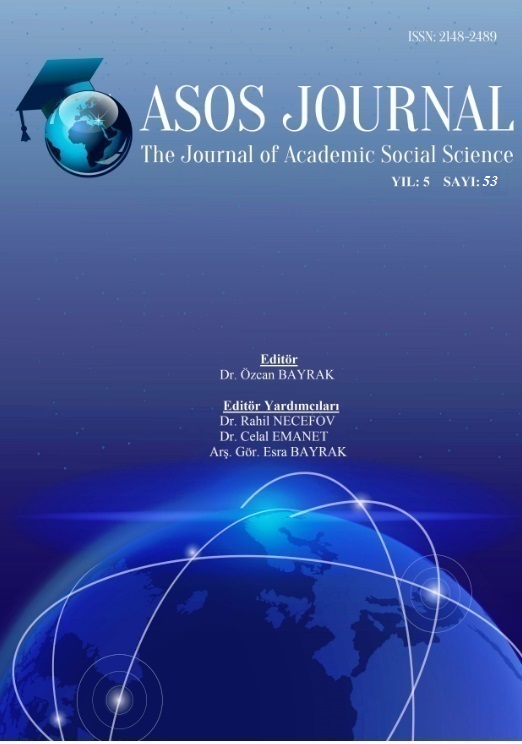HALİDÎ TASAVVUF GELENEĞİNDE FIKIH VE TASAVVUF İLİŞKİSİ (SEYDA MUHAMMED EMİN EL-HAYDERÎ MEDRESESİ ÖRNEĞİ)
Author :
Abstract
Nakşibendiliğin Halidîlik kolu ilim, fıkıh, tasavvuf, tarikat ve şeriat birlikteliğine dayanan ameli bir tasavvuf geleneğidir. Genel olarak tasavvuf geleneğindeki fıkıh-fıkıh usulü eğitimi ve fıkıh-tasavvuf birlikteliği, Halidi Nakşibendi geleneğinde daha belirgin bir şekilde ön plana çıkmaktadır. Bu geleneğin muasır temsilcilerinden biri de 1927 ila 2003 yıllarında yaşamış olan Muhammed Emin el-Hayderî ve Hayderî medresesidir. Muhammed Emin el-Hayderî ve Hayderî Medresesi, Nakşibendiliğin Halidilik koluna Şeyh Ahmed el-Haznevî halkasıyla intisap etmektedir. Günümüzde Ahmed el-Hayderî’nin müderrisliğinde ilim ve tasavvuf merkezli irşad faaliyetlerine devam eden bu medresede, fıkıh ve fıkıh usulü eğitimi oldukça önemli bir yere sahiptir. Bu çalışma, genel anlamda fıkıh, fıkıh usulü, tasavvuf, tasavvuf ve fıkıh ilişkisini ele almakta ve tüm bunları Halid-i Nakşibendi geleneği ve bu geleneğin muasır temsilcilerinden Hayderî medresesi örneğinde incelemektedir.
Keywords
Abstract
The Khalidi branch of the Naqshbandi order is an applied tradition of Sufism based on the unity of science, fiqh, Sufism and Shariah. The education of fiqh and fiqh procedure (usūl alfiqh) and unity of fiqh and Sufism in the tradition of Sufism in general come into prominence in the Khalidi Naqshbandi tradition more specifically. One of the contemporary representatives of this tradition is Muhammad Amin al-Haydari who lived between 1927 and 2003, and Haydari madrasah. Muhammad Amin al-Haydari and Haydari madrasah are related to the Khalidi branch of the Naqshbandi order through Sheikh Ahmad al-Haznevi’s circle. The education of fiqh and fiqh procedure (usūl alfiqh) has a highly significant place in this madrasah that continues its guiding activities based on science and Sufism under the guidance of Ahmad al-Haydari. This study discusses fiqh, fiqh procedure (usūl alfiqh), Sufism and the relationship between Sufism and fiqh in general, and examines them as part of the Khalidi Naqshbandi tradition and in the case of Haydari madrasah, one of the contemporary representatives of this tradition.
Keywords
- Abdulkerim Zeydan, (2006). el-Vecîz fî Usuli’l-Fıkh. Beyrut: Müessesetu’r-Risale.
- Akçay, Halil, (2013). “Son Dönem Tasavvuf Alimlerinden Şeyh Muhammed Emin el-Hayderî (Hayatı ve Eserleri)”. Bingöl: Bingöl Üniversitesi Yay.
- Alaeddin Haznevî, (2012). Hazret ve Şahı Hazne (Hayatı Menkıbeleri), Trc. Abdullah Demiray. İstanbul: Semerkand Yay.
- Algar, Hamid, (1997). “Halid el-Bağdâdî”. Ankara: DİA, XV, (283-285).
- Algar, Hamid, (2013). Nakşibendilik. İstanbul: İnsan Yay.
- Ayiş, Mehmet Şirin, (2015a). Elmalılı Tefsirinde Tasavvuf. İstanbul: Rağbet Yay.
- Ayiş, Mehmet Şirin, (2015b). Tarikat Adabı. İstanbul: Rağbet Yay.
- Bardakçı Necmettin, (2015). Doğuştan Günümüze Tasavvuf ve Tarikatler. İstanbul: Rağbet Yay.
- Bardakoğlu, Ali, (2017). İslam Işığında Müslümanlığımızla Yüzleşme. İstanbul: Kuramer Yay.
- Buharî, Alâuddîn Abdulazîz b. Ahmed (ö.730/1330), (1997). Keşfu’l-Esrâr ‘an Usûli Fahri’l- İslâm el-Pezdevî. Beyrut: Daru’l-Kutubi’l-İlmiyye.
- Cezerî, Muhammed b. Yusuf (ö.711/1311), (2011). Mi’râcu’l-Minhâc Şerhu Minhâci’l-Vusûl ila İlmi’l-Usûl, Thk. Şaban Muhammed İsmail. Mekke: Daru İbn Hazm.
- Debusî, Ebu Zeyd Ubeydullah b. Ömer b. İsa, (2007). Takvimu’l-Edille. Beyrut: Daru’l-
- Demirci, Mehmet, (1997). “Hakikat”, Ankara: DİA, XV, (178-179).
- Ethem Cebecioğlu, (2005). Tasavvuf Terimleri ve Deyimleri Sözlüğü. İstanbul: Anka Yay.
- Esad Sahib, (2004). Mektubat-ı Mevlana Halid (64. Mektub). İstanbul: Sey-Tac Yay.
- Ferhat Koca, (2002). “Osmanlılar Dönemi Fıkıh-Tasavvuf İlişkisi: Fakılar ile Sofular Mücade- lesinin Tarihi Serüveni”. Çorum: Gazi Üniversitesi Çorum İlahiya Fakültesi Dergisi, c.I, (73-131).
- Ferhat Koca, (2016). “İslam Düşüncesinin Kurucu Unsurları: Usûl-ı Fıkıh, Kelâm, Ta- savvuf ve İslam Felsefesi”. İstanbul: Ensar Neşriyat.
- Gazalî, Ebu Hamid Muhammed b. Muhammed, (2010). el-Mustasfâ min İlmi’l-Usul. Beyrut: Daru’l-Kutubi’l-İlmiyye.
- Hayrettin Karaman, (1996). “Fıkıh”. Ankara: DİA, XIII, (1-14).
- İbn Cemaa, Bedruddin el-Kinanî, (2015). İslami Gelenekte Eğitim Ahlakı, (Çev. Muhammet Şevki Aydın). Ankara: TDV Yay.
- İmam Rabbânî Ahmed Faruk Serhindi, (1977). Mektûbat, İstanbul: Merve Yay.
- Kamil Yılmaz, (2007). Ana Hatlarıyla Tasavvuf ve Tarikatler. İstanbul: Ensar Yay.
- Kara, Mustafa, (1986). “İbn Teymiye’nin Tasavvuf Istılahlarına Bakışı”. Bursa: Uludağ Üniver- sitesi İlahiyat Fakültesi Dergisi, c.I, (53-61).
- Kara, Mustafa, (1999). “İbn Teymiye”. İstanbul: DİA, XX, (413-414).
- Konur, Himmet, (1998). "Şeriat ve Tasavvuf". Ankara: İslamiyat Yay., Cilt: I, Sayı: 4, (119- 126).
- Memiş, Abdurrahman, (2000). Halidi Bağdadi ve Anadoluda Halidilik. İstanbul: Kitabevi Yay.
- Mevlana Halid, Ebü’l-Behâ Ziyâüddîn Hâlid b. Ahmed b. Hüseyn eş-Şehrezûrî (2015). Mektûbat, Thk. Ali Karadaği. Beyrut: Haşimi Yay.
- Molla Fenarî, Şemsuddin Muhammed b. Hamza b. Muhammed er-Rûmî, (2006). Fusûlu’l- Bedayî fî Usuli’ş-Şerayi, Muhammed Hasan Muhammed Hasan İsmail. Buyrut: Daru’l
- Molla Hüsrev, Muhammed b. Feramurz, (2011). Mir’âtu’l-Usul Şerhu Mirkati’l-Usul, Thk. İlyas Kaplan et-Türkî. Beyrut: Daru Sader.
- Öngören, Reşad, (2001). “Tasavvuf”. İstanbul: DİA, XL, (126-127).
- Özel, Ahmet, (1999). “İbn Abidin”. İstanbul: DİA, XIX, (292-293).
- Razi, Fahruddin Muhammed b. Ömer (ö.606/1210), (2008). el-Mahsûl fi İlmi Usuli’l-Fıkh. Bey- rut: Müessesetu’r-Risale.
- Şafiî, Muhammed b. İdris, (2003). Divan-ı İmam Şafiî. (Cem-Tahkik-Ta’lik: Ahmed Ahmed Şi- tevî). Mısır: Daru’l-Ğadi’l-Cedîd.
- Şatıbî, İbrahim b. Musa b. Muhammed el-Ğırnatî, (2002). el-Muvafakat fî Usuli’ş-Şeria. Beyrut: Daru’l-Kutubi’l-Arabî.
- Şeyh Seyda Muhammed Emin Hayderî, (2015). Tuhfetu’l-Hayderî. Diyarbakır: Seyda Kitabevi.
- Şirbînî, Şemsuddin Muhammed, b. Ahmed el-Hatîb, (1994). Muğni’l-Muhtac ilâ Ma’rifeti Maâni Elfazi’l-Minhac. Beyrut: Daru’l-Kutubi’l-İlmiyye.
- Türer, Osman, (1995). Ana Hatlarıyla Tasavvuf Tarihi. İstanbul: Seha Yay.
- Uludağ, Süleyman, (2001). Tasavvuf Terimleri Sözlüğü. İstanbul: Kabalcı Yay.
- Uludağ, Süleyman, (2012). “Tasavvufun Kaynağı”, Yüzüncü Yıl Üniversitesi Uluslararası Mev- lana Halid Sempozyumu (11-13 Haziran, 2010, Van). Ankara: TDV Yay.
- Yılmaz, Kamil, (2007). Ana Hatlarıyla Tasavvuf ve Tarikatler. İstanbul: Ensar Neşriyat.
- Yıldız, Kemal, (2005). “Zâhir-Bâtın Dayanışması: Mutasavvıf Mevlânâ Hâlid İle Fakîh İbn Âbidîn Örneği”. İstanbul: Tasavvuf: İlmî ve Akademik Araştırma Dergisi, Yıl: 6, Sayı: 15.
